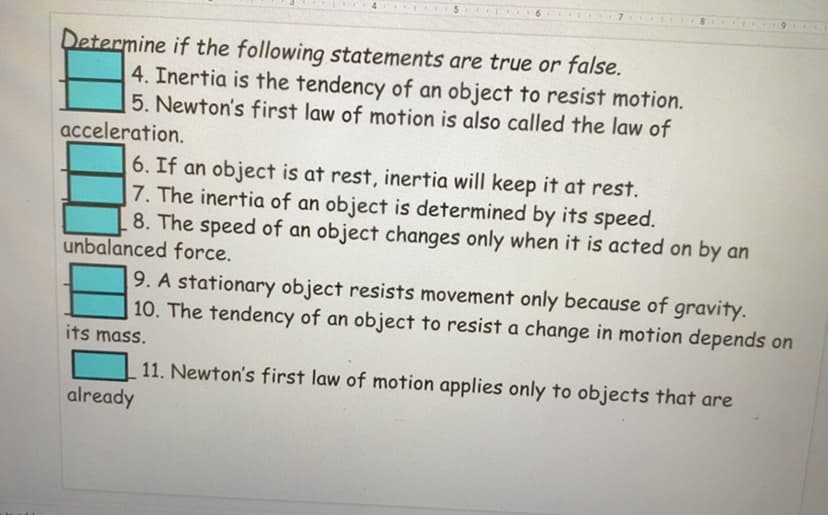Determine if the following statements are true or false. 4. Inertia is the tendency of an object to resist motion. 5. Newton's first law of motion is also called the law of acceleration. 6. If an object is at rest, inertia will keep it at rest. 7. The inertia of an object is determined by its speed. 8. The speed of an object changes only when it is acted on by an unbalanced force. 9. A stationary object resists movement only because of gravity. 10. The tendency of an object to resist a change in motion depends on its mass. 11. Newton's first law of motion applies only to objects that are already
Determine if the following statements are true or false. 4. Inertia is the tendency of an object to resist motion. 5. Newton's first law of motion is also called the law of acceleration. 6. If an object is at rest, inertia will keep it at rest. 7. The inertia of an object is determined by its speed. 8. The speed of an object changes only when it is acted on by an unbalanced force. 9. A stationary object resists movement only because of gravity. 10. The tendency of an object to resist a change in motion depends on its mass. 11. Newton's first law of motion applies only to objects that are already
Physics for Scientists and Engineers, Technology Update (No access codes included)
9th Edition
ISBN:9781305116399
Author:Raymond A. Serway, John W. Jewett
Publisher:Raymond A. Serway, John W. Jewett
Chapter6: Circular Motion And Other Applications Of Newton’s Laws
Section: Chapter Questions
Problem 6.4CQ: Describe the path of a moving body in the event that (a) its acceleration is constant in magnitude...
Related questions
Question
100%
Can someone please help me ( it’s all one question by the way !!)

Transcribed Image Text:Determine if the following statements are true or false.
4. Inertia is the tendency of an object to resist motion.
5. Newton's first law of motion is also called the law of
acceleration.
6. If an object is at rest, inertia will keep it at rest.
7. The inertia of an object is determined by its speed.
8. The speed of an object changes only when it is acted on by an
unbalanced force.
9. A stationary object resists movement only because of gravity.
10. The tendency of an object to resist a change in motion depends on
its mass.
11. Newton's first law of motion applies only to objects that are
already
Expert Solution
This question has been solved!
Explore an expertly crafted, step-by-step solution for a thorough understanding of key concepts.
This is a popular solution!
Trending now
This is a popular solution!
Step by step
Solved in 2 steps

Knowledge Booster
Learn more about
Need a deep-dive on the concept behind this application? Look no further. Learn more about this topic, physics and related others by exploring similar questions and additional content below.Recommended textbooks for you

Physics for Scientists and Engineers, Technology …
Physics
ISBN:
9781305116399
Author:
Raymond A. Serway, John W. Jewett
Publisher:
Cengage Learning

College Physics
Physics
ISBN:
9781938168000
Author:
Paul Peter Urone, Roger Hinrichs
Publisher:
OpenStax College


Physics for Scientists and Engineers, Technology …
Physics
ISBN:
9781305116399
Author:
Raymond A. Serway, John W. Jewett
Publisher:
Cengage Learning

College Physics
Physics
ISBN:
9781938168000
Author:
Paul Peter Urone, Roger Hinrichs
Publisher:
OpenStax College


An Introduction to Physical Science
Physics
ISBN:
9781305079137
Author:
James Shipman, Jerry D. Wilson, Charles A. Higgins, Omar Torres
Publisher:
Cengage Learning